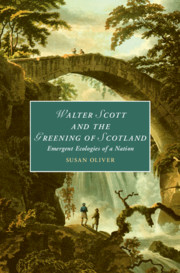Book contents
- Walter Scott and the Greening of Scotland
- Cambridge Studies in Romanticism
- Walter Scott and the Greening of Scotland
- Copyright page
- Dedication
- Contents
- Illustrations
- Acknowledgements
- Chronology of Works Referenced
- Chapter 1 Introduction
- Chapter 2 Shifting Ecologies
- Chapter 3 Toxic Ecologies, Ecogothic and Violence against the Land
- Chapter 4 Wild Places, Rarity and Extinction
- Chapter 5 Trees
- Chapter 6 Stone, Water, Air
- Notes
- Bibliography
- Index
- Cambridge Studies in Romanticism
Chapter 4 - Wild Places, Rarity and Extinction
Published online by Cambridge University Press: 30 July 2021
- Walter Scott and the Greening of Scotland
- Cambridge Studies in Romanticism
- Walter Scott and the Greening of Scotland
- Copyright page
- Dedication
- Contents
- Illustrations
- Acknowledgements
- Chronology of Works Referenced
- Chapter 1 Introduction
- Chapter 2 Shifting Ecologies
- Chapter 3 Toxic Ecologies, Ecogothic and Violence against the Land
- Chapter 4 Wild Places, Rarity and Extinction
- Chapter 5 Trees
- Chapter 6 Stone, Water, Air
- Notes
- Bibliography
- Index
- Cambridge Studies in Romanticism
Summary
Scott’s attention to endangered animals, birds and plants as well as to processes of extinction is explored in this chapter. Discussion evaluates how awareness of the precarity attending reduced biodiversity in the nineteenth century, as represented in Scott’s historical fiction, can inform understanding of the drivers of similar crises in our own time. The case studies address problems arising from fetishized or idealistic views of Scotland’s ‘wilder’ environments. Enquiry also focuses on ecologies in places that are marginal to, or remote from, urban centres, while endangered human communities such as those of the Highlands before the late eighteenth-century clearances and others that followed are shown to be integral parts of threatened environments. Wolves, beavers, raptors, wild cattle and wild cats are among the species considered. The problems that attend rewilding and conservation strategies are discussed with attention to what is not, or cannot be, preserved or replaced.
- Type
- Chapter
- Information
- Walter Scott and the Greening of ScotlandEmergent Ecologies of a Nation, pp. 88 - 112Publisher: Cambridge University PressPrint publication year: 2021

